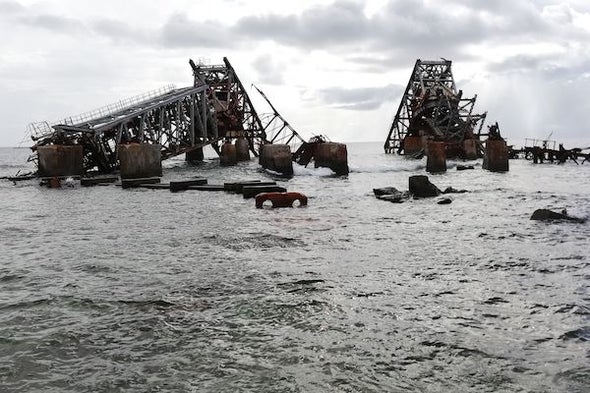by JAMES FAHN
 Abandoned phosphate harbor on the Pacific island of Nauru, which is acutely threatened by rising seas. PHOTO/Mike Leyral, Getty Images
Abandoned phosphate harbor on the Pacific island of Nauru, which is acutely threatened by rising seas. PHOTO/Mike Leyral, Getty Images
Yes, the news on climate change is bad. That’s why we need more of it
When I’m trying to impress people, I like to tell them that I won the Nobel Peace Prize. Yes, that’s right.
Okay, maybe you’ve never heard of me, and it’s true I don’t rank up there with Mother Teresa or Elie Wiesel. But arguably thousands of people can make claim to have won the prize because in 2007 it was awarded to the Intergovernmental Panel on Climate Change (IPCC), a grouping of thousands of scientists and other experts who regularly evaluate the latest science to report on the state of the climate and the prospects for our planet.
Seven years earlier, while taking a break from my career as a journalist to work for a brief stint at the National Oceanic and Atmospheric Administration (NOAA), I was tasked with overseeing the US government’s review of the IPCC’s Third Assessment Report, gathering feedback from various agencies to send as an official response to the report. So I was in theory a very small part of the IPCC, and thus a recipient of an ever so minute portion of the prize. Hey, when it comes to climate change, you take what victories you can get.
Advertisement
The IPCC has been in the news lately because it recently released a striking new report documenting that the impacts of climate change have generally been worse than expected. They also concluded that the target the world’s governments had set of keeping average global warming to no more than 2 degrees Celsius is probably not enough to avoid planetary catastrophe. They concluded that is likely to occur even with a 1.5 degree rise, a level we might reach by 2040 if greenhouse gas emissions continue at the current rate, costing the planetary economy an estimated $54 trillion.
The situation, in other words, is much worse than people thought.
That is a hard message for journalists to tell in our stories. Yes, it is true that even if governments meet all the commitments they made to the landmark 2015 Paris Climate Agreement, we probably still won’t be able to keep average global warming below 3 degrees, if that. And the fact is that in the current political climate—not only is the U.S. led by a climate change denier, but Brazil has elected one as president too, putting the fate of the Amazon rainforest and other ecosystems into question—even the hope of fulfilling those commitments seems tenuous. Most Americans care about climate change, but not enough to make it a priority when voting. Some communications experts, however, worry that too much candor about the dire outlook may cause people to throw up their arms in despair and simply carry on with business as usual, even as the forests burn.
On the other hand, journalists have a responsibility to be honest about our planetary prospects, and to report as often and openly as possible about climate change. A recent column by Margaret Sullivan emphasizing the need for more and better media coverage explains quite eloquently that our civilization may be at stake.
Scientific American for more
